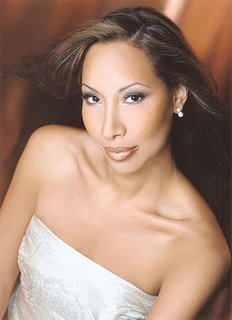
By GAYLE WORLAND in
The Wisconsin State Journal
It's the first day of rehearsals for Madison Opera's production of "The Magic Flute," and Nicole Cabell has just arrived in Madison - from Barcelona, that is, via Rome and Chicago, getting separated from her luggage along the way.
But somehow, Cabell has it all together.
Strolling through the Concourse Hotel lobby with her long, slender frame, her striking features and thick dark hair pulled back into a ponytail, Cabell could easily be mistaken for a dancer or simply an exotic beauty. In fact, she's a 28-year-old, rising opera star - a "diva," technically, but without an ounce of the pretension that label might imply.
Though she's here for an opera role (she'll play Pamina in Mozart's "Magic Flute" Friday and Sunday, April 23 in Overture Hall), the down-to-earth Cabell is intent on developing a varied, well-rounded career for herself.
"I want to be a classical singer, not just an opera singer," she says, wearing jeans and sipping green tea in the hotel coffee shop. "I enjoy concert work, chamber music and recitals. I like to split my time up amongst all of them."
Lately, that splitting has been nonstop. Since she won the prestigious BBC Cardiff "Singer of the World" competition in Wales last June, Cabell has been traveling the world - including this month's stops in Rome and Barcelona. In December she recorded her first solo album in London under an exclusive contract with Decca Records. In January, she made a quick stop in Wisconsin for a Madison Opera-sponsored recital and audience chat.
"I've had a week off here and there," says Cabell, who also played Pamina in a Palm Beach Opera production in February. "But that's not really time off, because you have to prepare roles."
That's what happens when The New York Times calls one's voice "a light and outrageously beautiful soprano," the Chicago Tribune describes it as "limpid radiance," or The Detroit News praises one's Musetta in "La Boheme" as "electrifying."
"For the next year, (life) will be a little busy for my taste," says Cabell, reaching to turn off a ringing cell phone. "But - you have to pay your dues. I have to learn all these roles and do all these concerts because I have to build my repertoire. When you're starting out, you take the offers, because you want to work, you want to show people that you are enthusiastic about this business."
A self-described "Disneyland junkie" who loves movies and shopping as well as writing fiction, Cabell grew up in the "safe and predictable" California beach town of Ventura. She never really heard classical music as a kid, but she did play the flute in junior high band. And she played basketball with a friend who, like Cabell, loved to clown around imitating opera singers.
"Both of us had this weird inner knowledge that we could do it," says Cabell, whose ancestry is African American, Korean and Caucasian. "You know, you sing along with the radio, and I thought, 'Hmm, I can keep a tune.'"
Her mother encouraged her to join the school choir; she tried out for a school musical and was a hit. Only at age 15, Cabell began to notice that "People obviously can hear something, even if I can't," she says. "That's sort of how it's been: I've been walking through doors as they've been presented to me."
After three years of private lessons in high school (one voice teacher quickly referred Cabell to her voice teachers), Cabell attended the Eastman School of Music in Rochester, N.Y. She then headed to the Lyric Opera Center for American Artists in Chicago, now her home base, where opera talents undergo a three-year paid training program in everything from acting and stage combat to foreign languages and music. She found mentors in the center's director, Richard Pearlman, and opera superstar Marilyn Horne, among others.
"For me, it's important to go slow with opera," says Cabell, who also loves singing tunes from the Great American Songbook and mentions Dawn Upshaw, an opera singer known for delving into a wide range of styles, as a sort of career role model.
"Singing opera can be demanding on the voice if you take on the wrong roles."
Fortunately, Mozart's Pamina feels right. The character is the daughter of the Queen of the Night (played in the Madison Opera production by operatic superstar Sumi Jo), and has been abducted by Sarastro, the high priest of a brotherhood dedicated to wisdom and enlightenment. The Queen asks the prince Tamino (Richard Troxell) and her birdcatcher Papageno to rescue Pamina. In the end, Pamina joins with Tamino and both set off on a higher path.
"I think sometimes she can be played so reserved - and I think that makes for a dull Pamina," says Cabell. "The music is so beautiful and the lines are - perfect. It's difficult; it's exposed singing, with very light orchestra, and some of the most difficult pianissimo lines and high notes.
"But for me, if the character is too much like the music, she can be two-dimensional," she says. "I like to play her with a little more passion. She is never a fluffy person."
Link:
• Madison Opera
Photo Credit: Devon Cass


No comments:
Post a Comment